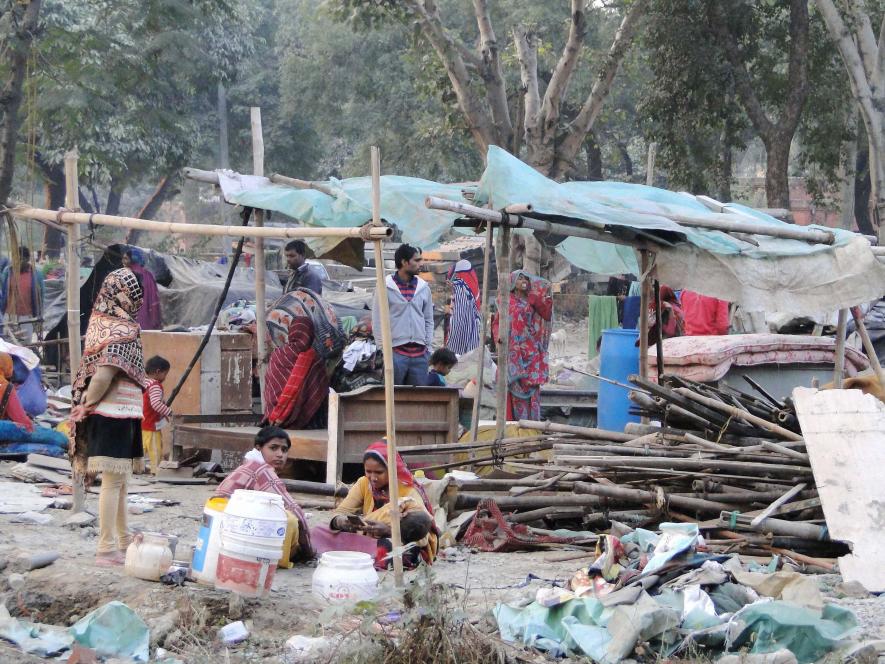103 Slums, Farmhouses on Delhi Ridge to be Demolished

People collect their belongings after a demolition drive carried out by the railways in Shakur Basti of Delhi on Sunday. Image Courtesy: PTI
Thousands of residents in the national capital were left homeless after several demolition drives were conducted to free up government land last year.
Violence was reported during several such drives, which were ordered by the MCD, DDA and the forest department in Khori Village, Shaheen Bagh and Gyaspur Basti.
Now, the forest department has drawn up a list of 103 jhuggi jhopri (JJ) clusters (slums) and farmhouses (numbers not available) allegedly built on the forestland that would be demolished following an NGT order which directed the Delhi government to prepare a list of forest encroachments.
As listed in Section 20 of the Indian Forest Act, 1920, these areas were not notified as forestland earlier but now are part of ‘reserved forest’. The Act prohibits the acquisition of land declared as ‘reserved forest’ unless it is under a grant or contract made or entered into by or on behalf of the government.
As per reports, an updated map of the Delhi Ridge, including marking geo coordinates, was completed in 2107, and a demolition drive began in different parts of the city soon. Almost 70% of the Ridge has been declared encroachment-free since 2017 with around 4,500 hectares of its 6,210 hectares being cleared.
The biggest issue is the lack of a rehabilitation policy for clusters identified as encroachments. The Delhi High Court is hearing two cases, Rangpuri Pahadi Basti Union vs DUSIB and Fatima & ANR vs DUSIB, wherein the affected people filed petitions seeking rehabilitation.
The court issued stay orders in both cases and directed the Delhi Urban Shelter Improvement Board (DUSIB) to provide proper rehabilitation to the affected residents. Subsequently, the DUSIB and the forest department sought a legal opinion on restoring the rights of eligible residents.
The forest department didn’t respond to Newsclick’s query about the clarity on rehabilitation.
Experts believe that the long-pending demand for a Right to Housing Act should be fulfilled to get justice for the affected residents.
Majdoor Awaas Sangharsh Samiti convener Nirmal Gorana questioned the government’s intention and how it can throw people out without a rehabilitation policy.
“The government was never interested in implementing the NGT order. It was an attack on poor families. The BJP is furious after losing the MCD election. Displacing people without rehabilitating them is a human rights violation. We intend to approach the court and believe that it will hear us out as it issued the stay orders,” Gorana told Newsclick.
According to the Delhi Slum and Jhuggi Jhopri Rehabilitation and Relocation Policy, 2015, JJ clusters that came up before 2006 cannot be removed without providing alternate housing. Besides, a slum eligible for rehabilitation cannot be demolished without a court order.
In its landmark judgment in Sudama Singh & Others vs Government of Delhi, the HC had observed that dignified resettlement is the right of affected citizens before eviction.
“What very often is overlooked is that when a family living in a jhuggi is forcibly evicted, each member loses a ‘bundle’ of rights—the right to livelihood, to shelter, to health, to education, to access to civic amenities and public transport and above all, the right to live with dignity,” the court observed.
However, the government has not often complied with the order. Residents who got relief, such as in Khori Village, got it only after a long fight in the Supreme Court.
Get the latest reports & analysis with people's perspective on Protests, movements & deep analytical videos, discussions of the current affairs in your Telegram app. Subscribe to NewsClick's Telegram channel & get Real-Time updates on stories, as they get published on our website.
























